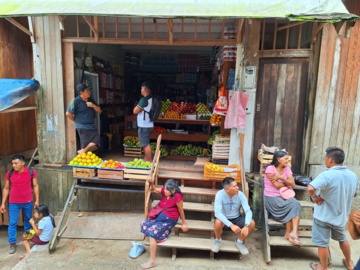
Ordinary Awajun life in Santa Maria de Nieva, northwest Peruvian Amazonia
Sarah Radcliffe is Professor emerita of Latin American Geography, at the University of Cambridge. She has published numerous books and articles on development and political geography, focussing over the past 25 years on the power-laden intersectional politics of indigeneity, and has contributed to the ongoing task of decolonizing geography. Funded by The Leverhulme Trust, her most recent research examines everyday Indigenous citizenship in Latin America.
What is it like to live as an Indigenous citizen in Peru today? Which modes of enquiry and analysis help move beyond formal Eurocentric notions of citizenship? These questions animate a multi-sited research process undertaken by a multiracial, multinational and multidisciplinary team in Peru’s Amazonia and Ecuador’s Andes. Co-producing the project design with Indigenous researchers and organisations, the team undertook extensive qualitative in-depth data-gathering and grounded analysis with Awajun in rural and urban Peru, and Kichwa in rural and urban Ecuador.
Sarah Radcliffe’s seminar focused on one dimension of the broader project, namely how ordinary Awajun individuals engage with and understand community and regional civil society organisations. In their everyday lives, Awajun find themselves discriminated against when they seek to access social and civic services, which are by law available to all Peruvian citizens without discrimination. Additionally, Awajun communities do not benefit from the coverage and quality of domestic infrastructural services (water, sewerage, internet, electricity) that urban, non-indigenous small towns and urban centres receive. Through these practices and dispositions, the state’s historic and current interventions build exclusionary and harmful landscapes experienced everyday by Awajun. Routine anti-indigenous, racialized, face-to-face discrimination in public services as well as inadequate measures to protect health and social thriving lead Awajun to understand themselves as ‘second-class’ citizens, as neither individual (as Peruvians) nor group rights (as an indigenous group) are effective in practice. Attending to these political geographies of everyday citizenship highlights how citizenship is produced in the dynamic interactions between norms, laws and everyday practices. Led by indigenous interlocutors, our project deepens previous research by focusing on nation-states’ and racial formations’ affective powers that profoundly mark and shape indigenous experiences, interpretations and embodied harms. Examining indigenous citizenship through this lens sheds important light on citizen-state relations in racialized margins. Infrastructural citizenship, the politics of waiting, and the role of street-level bureaucrats are shown to be both the means of reproducing Awajun disadvantage and of enforcing visceral impacts of structural violence.
In such contexts, the seminar drew on extensive interview material to interrogate the scope and types of structured agency expressed and practiced by ordinary Awajun (that is, people who are neither leaders nor activists). We locate everyday agency in the material and imaginative geographies of Awajun civil society in Condorcanqui province’s river-based cosmopolitics. The seminar outlined the expectations placed on Awajun and indigenous rights organisations, their perceived failings and successes, and how Awajun individuals understand organisational agendas. Given widespread state abandonment, associations pursue a combination of economic, civic and social rights to deliver practical, material care and more secure jurisdiction over collective territory. Civil society organisations are seen to care by tackling pollution from shoddy infrastructure and illegal mining, defending the environment, and informing communities of legal rights. Awajun critique corrupt leaders who pursue individual economic and political advancement over collective goals. Collating these experiences, Awajun formulate a highly sceptical view of the Peruvian state, which enacts exclusionary dispossession. Overall, Awajun engage in small political acts and struggles based on pragmatism.
The seminar was followed by a lively question and answer session with seminar attendees and a post-seminar reception. The seminar material, together with the research teams’ analysis and reflection, will be published in various formats over coming months.
Seminar on 29th April 2025